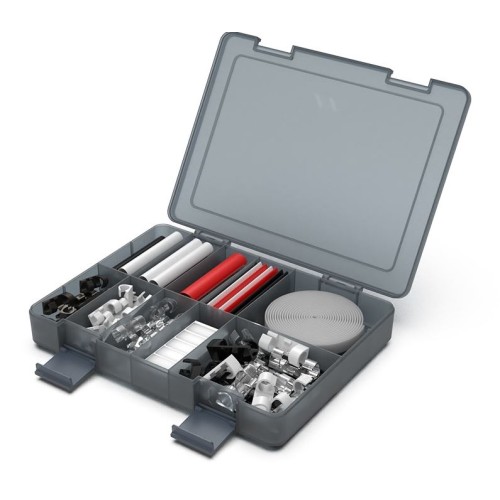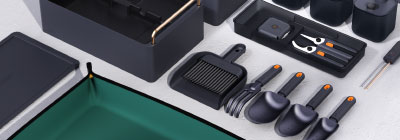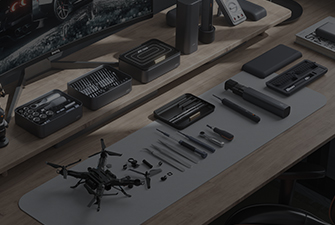
A well-prepared tool box stands as a professional's main asset for basic jobs such as gauging material to fastening screws accurately. This resource gives insight to opt for correct tools and apply them successfully.
- Begin assembling crucial hand tools such as hammer, screwdrivers, wrench set, pliers, saws and tape measures.
- Learn the role and practical uses of every tool for specialized tasks.
- Develop techniques through active projects, gradually making tasks more complex.
Keep in mind investing effort to master hand tools builds your craftsmanship. With thorough expertise, tools will enhance your capacity to deliver precise, demanding project outcomes.
Level Up Your Workflows with Power Tools
Prepared to supercharge projects? Explore robust power tools blending precision with speed. Such fundamental power tools can overhaul your workflow whether expert or enthusiast. From heavy-duty drills to intricate saws, power tools offer a spectrum of capabilities to tackle any construction project with ease.
- Tap into cordless impact drivers for seamless fastening and demo work.
- Master reciprocating saws for quick and clean cuts through wood, metal, and more.
- Take woodworking further with effective planers and jointers for polished accurate finishes.
Adopt power tools to quicken delivery and produce superior outcomes.
Precision Made Easy
When detail is crucial, the right measuring gear alters quality considerably. From common tapes to advanced digital calipers, measurement aids support accurate execution of designs. Whether veteran artisan or new hobbyist, mastering essential measuring tools opens many possibilities.
- Investigate the wide selection of measuring devices catering to varied needs.
- Absorb the uses and benefits tied to every variety of measuring device.
- Advance your capability in precise measurement and practical usage.
Tool Sets for Every Task
Professional or enthusiast, the ideal set of tools is fundamental to project execution. When working on assembly or fastening tasks, the proper kit guarantees better accuracy and safety. To pick an ideal toolset, assess the types of tasks you'll perform regularly.
Do you require a broad toolkit or will a specialized kit be adequate? Once you know what you need, survey options to compare features, build quality and price. Make sure to read peer reviews online to gather useful perspectives before buying.
By investigating and planning, pick the perfect toolkit to handle jobs with certainty.
Maintaining Your Hand Tools for Peak Performance
Caring for tools properly is critical for craftsmen and home builders. Skipping care leads to blunt cutting edges, part failures and unsatisfying results. Regular maintenance ensures your tools remain in top shape, providing you with years of reliable service. After use, wipe and remove grime from tools to maintain condition. House tools in dry conditions to prevent rust formation and corrosion.
- Sharpen cutting tools consistently with a stone or fine file.
- Oil moving components with suitable lubricant to minimize friction and wear.
- Inspect grips routinely for wear and substitute damaged handles as necessary.

By keeping to these maintenance habits you prolong tool life and enjoy smoother project outcomes.
Basic Hand Tools Every Home Workshop Needs
A outfitted workshop makes a retreat for DIY lovers and weekend makers. Specialty instruments help, but a strong set of basic tools is essential for most projects. Recommended basics are a reliable hammer, adjustable wrench and quality tape measure for accurate gauging. Have an assortment of screwdrivers, capable pliers and a utility knife for cutting materials. A capable saw handles precise cutting and a level preserves alignment and straightness.
- Essential Hand Tools for the Home Workshop

Demystifying Power Tool Safety: A Comprehensive Guide
Power tools are influential devices that supply major power and operational efficiency. But these tools insist on careful adherence to safety guidelines. Overlooking protection protocols can cause dangerous injuries. This resource illuminates power tool safety, supplying the knowledge to use tools responsibly.
Kick off by learning your tools—read manuals thoroughly and absorb the specific safety features. Make it a rule to equip PPE including eye protection, ear guards and gloves. Maintain your tools regularly to ensure proper functioning.
Always remember safety is the foremost concern in workshops. Adhering to these recommendations lets you use power tools securely and with confidence.
Picking Accurate Measuring Tools
In obtaining accurate measurements, the measuring tools you opt for play a critical role. Various measuring instruments are on the market, each suited to specific functions. Knowing tool characteristics matters when making informed selections. Weigh considerations like precision, resolution and measurement type for the right tool choice.
- To measure lengths precisely, use a ruler or tape measure commonly.
- To measure angles, a protractor is essential.
- Electronic calipers offer ideal capabilities for tiny dimension measurement.
By picking appropriate measuring tools thoughtfully you ensure reliable accurate outcomes.
Choosing the Best Comprehensive Tool Set

Searching for the right tool set may be exciting and somewhat intimidating. As options multiply, feeling overwhelmed is understandable. This thorough resource equips you to select the perfect toolkit for your needs.
First and foremost, consider the type of projects you'll be undertaking. Do you have professional experience or are you starting out? Clearly stating goals focuses choices.
- Use both hand and power tools together when suitable for optimal, efficient results Employ a blend of power and manual tools to reach productive and precise outcomes Mixing hand and power tools Hand Tools often yields the best, most efficient outcomes
- Give precedence to core necessary tools
- A quality hammer, plus mallet or sledgehammer options
- Screwdriver, wrench and plier assortments are indispensable versatile items
- Ruler, tape measure for precise measuring
- Level, plumb bob or transit for alignment
Take into account the materials, budget and brand credibility when selecting. Remember that investing in a durable tool set is an investment in the long term.
Master DIY Tools with Ease
Beginning your initial DIY project can appear overwhelming. Yet with proper gear and some savvy, the most difficult tasks become doable. Initiate by getting familiar and learning tool operations. Study the manuals and practice basic techniques in a controlled, safe setting. Remember, safety should always be your top primary first priority. Wear suitable PPE including goggles, gloves and earplugs to shield yourself.
In selecting tools, value durability and solid build quality. Opt for established brands that deliver durable, long-lasting tools.
Reach out to experienced DIYers or store experts for guidance and recommendations. They can offer valuable tips insights suggestions on choosing the best most suitable ideal tools for your needs requirements projects.
- Keep your tools sharp and in good condition.
- Organize your tools for easy access and longevity.
- Experiment with new DIY challenges to improve skillset
Power vs Hand Tools: How to Choose
For a project, deciding between power and hand tools might feel like a tough dilemma. While power tools deliver speed and robustness, hand tools continue to be necessary for precise, delicate tasks. This breakdown helps you select the right tool type for your specific job.
- Hand tools are ideal perfect suited for finer detailed precise work like carving, assembling fitting constructing, and intricate repairs. They give superior control and tend to be more affordable and cost-effective.
- Power tools perform best when you need speed and efficiency for sawing, drilling and surface work. They markedly minimize labor and accelerate completion times.
In the end, tool selection hinges on the specific task, your skill set and available budget. Combine hand and power tools strategically for successful and efficient project completion.
